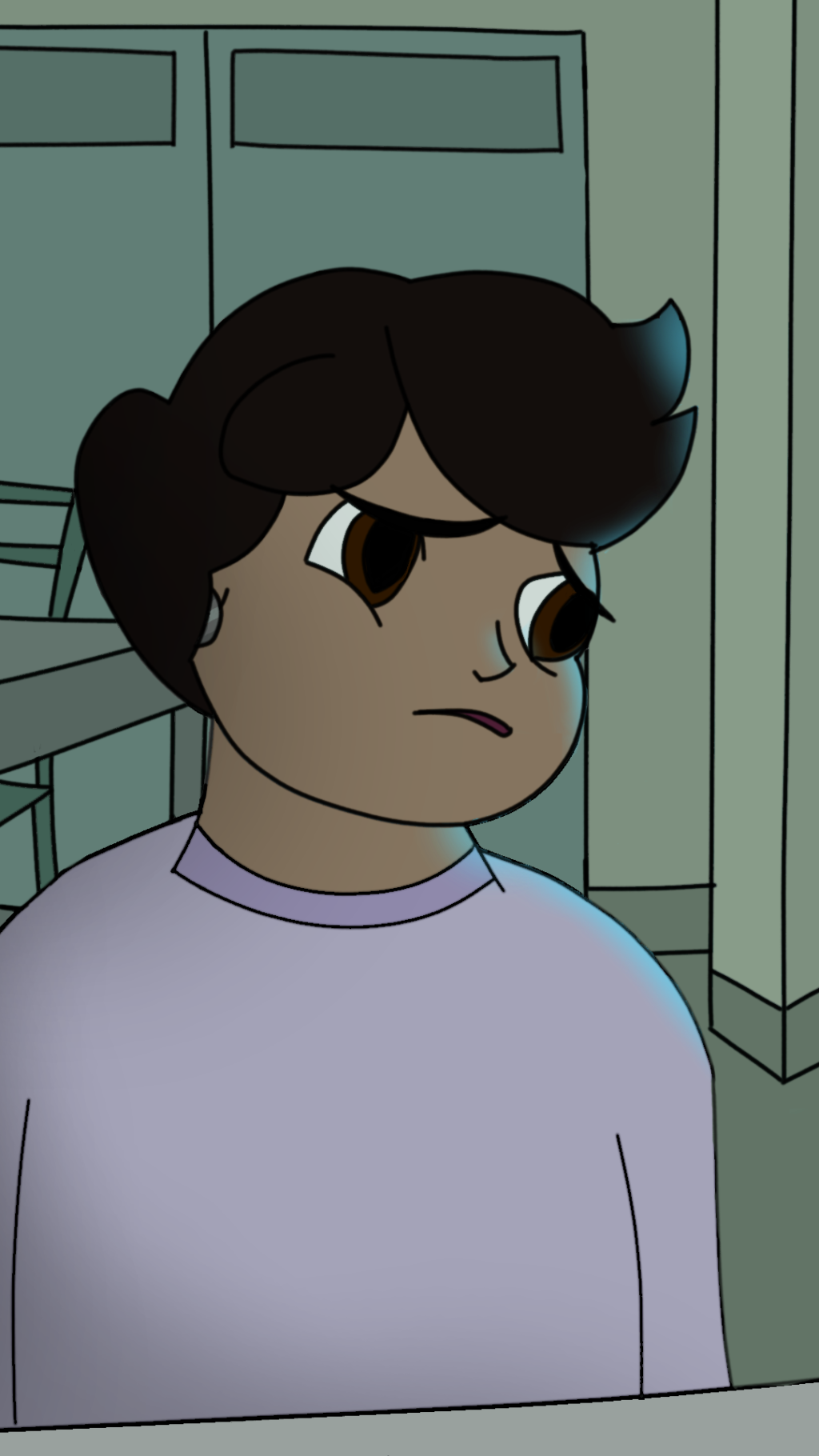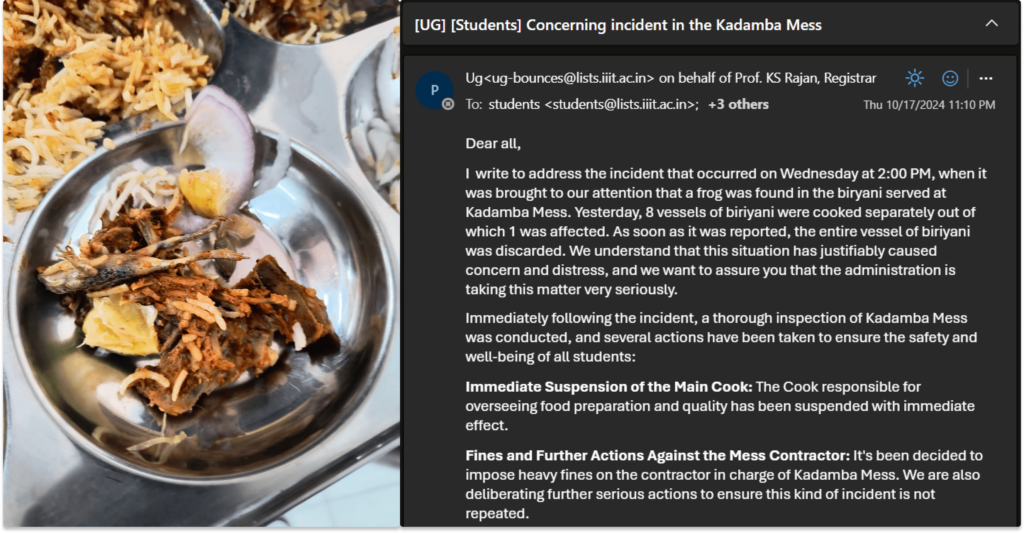Qu’ils mangent de la grenouille! (Let Them Eat Frogs!)

Langars have been an important part of the Sikh way of life ever since the founding of the religion in the late 15th century. Fostering a sense of equality and strengthening a sense of community, Langars are communal meals shared by visitors to a Gurdwara – irrespective of their religion, caste, or economic status. The langar at the Golden Temple feeds over 50,000 people every day. Despite the massive number of people fed at langars, langars are well-known for their food cleanliness measures and standards.
Langars are a testament to the feasibility of maintaining a large-scale food distribution system (that too via community service), and one can hope to expect similar quality of food at a private, premier tech institute in the country. Yet, food safety and cleanliness has been a recurring issue in our college’s messes (of which there are four – North, South, Kadamba, and Yuktahar) for a while now. However, last week saw this reach a breaking point, and two major incidents in the IIIT mess system have left students in disbelief, disappointment, and most of all, distrust.
This article seeks to document the major mess-related events that have occurred over the past year. To narrate this tale, we start from the Panini Linguistics Olympiad (PLO) camp that the institute conducted in late May.
The PLO Camp Fiasco
The Panini Linguistics Olympiad is the Indian national program for selection and training of the candidates who represent India at the International Linguistics Olympiad (IOL).
Since 2016, when the honor was handed over to the institute by Microsoft Research, IIIT has organized and conducted a 7 to 10 day training camp as the final round in the selection process of the PLO every year.
As per schedule, the camp started on the 29th of May, with the participants taking part in lectures from esteemed faculty in the field of linguistics. Not on schedule, however, was the hospitalization of several participants who had suddenly taken ill. A common factor quickly identified was that the high school students had all eaten at the Kadamb mess. Several other students from IIIT, who had also eaten at Kadamb, also claimed illness and stomach issues at the time.
Led by a viral post on ‘X’ from Shashwat Goel, a recent graduate from IIIT, students began posting several incriminating photos showcasing flies, cockroaches, other insects, and even rats, in the food and mess areas, showing how the issue of cleanliness in the mess has been a constant and long-standing issue.
Although this was the tipping point, students had been complaining of stomach issues and illness after having meals in the mess for several weeks. The response from the hostel authorities so far had been to shift blame towards food ordering services, like Zomato and Swiggy.
However, given the student and media uproar, the institute responded by indefinitely closing Kadamba mess from the 31st of May for “kitchen maintenance works”. This, however, wasn’t the end of the tale. In the following days, several members of the IIIT student community continued to fall ill, many after eating the same meal in the same mess.
Many email threads later, responses from both the registrar and the student parliament were shared. Their emails provided information regarding the results of tests on both food and water samples, short-term measures being implemented in hopes of preventing further cases, and in the future, scheduled closing down of each mess for cleaning and maintenance works.
After a faculty-student interaction (FSIS) on the 8th of June, further measures were decided upon, including providing hot water for cleaning dishes, the temporary stoppage of the preparation of certain food items, vaccinations for mess workers, and the addition of more insect killer machines in each mess.
In the following weeks of the summer, firstly, the Yuktahar mess was closed, followed by the simultaneous closure of the North and South messes and the reopening of Kadamba and Yuktahar.
As the summer heat simmered down, the flames of collective outrage were quenched in the Hyderabad monsoon, and things went back to normal, or however normal as life in IIIT can be.
(For more, see our coverage of the incidents in May and June – a Tale of Two Cheenties)
A Taste of French Cuisine
Apart from a few insects and a couple of pieces of plastic found in North mess, food concerns weren’t primarily on anyone’s minds (though it’s concerning how common this is and how, as a community, we move past such incidents with barely a glance). However, in the afternoon on 16th October, unsatisfied with just serving insects, Kadamba decided to venture North-West and take a page out of French cuisine, perhaps in an effort to spice things up. Over 24 hours later, on several WhatsApp groups, information was shared that a frog was found in the chicken biryani regularly served for lunch on Wednesdays at Kadamba.
Several hours later, at almost 11PM, a mail from the Registrar (Prof. KS Rajan) was sent out detailing the incident and the response taken by the institute. These actions being (these are unaltered quotes),
- “A thorough inspection of Kadamba Mess was conducted”
- “The Cook responsible for overseeing food preparation and quality has been suspended with immediate effect.”
- “It’s been decided to impose heavy fines on the contractor in charge of Kadamba Mess. We are also deliberating further serious actions to ensure this kind of incident is not repeated.” (The exact nature of this fine was revealed later on the 26th of October during a meeting with the Registrar. The contractor is paid a per-plate fee of ₹4. The fine was a combination of a retroactive cut in the money made by the contractor in the past month of ₹3 per plate and a fine of ₹2 per plate going forward)
- “Soon after this was reported, faculty members started to conduct daily inspections of Kadamba Mess to ensure strict hygiene practices and proper food preparation standards are being followed.”

A swift response from the mess office came in the form of cancellation of non-veg meals in Kadamba. Yes, that’s right, it sounds as though their decision was based on the sadly false fact that frogs only jump into non-veg food. The apparent reason for this decision (which was not officially communicated) was to lower the load in Kadamba by freeing up the dedicated area for cooking non-veg meals.
Whether or not this measure was necessary (or if it helped) is open to debate, but several members of the IIIT community pitched in with their own opinions, suggestions, and insights in these multiple mail threads. Here’s a non-exhaustive list of points raised,
Several members of the IIIT community pitched in with their own opinions, suggestions, and insights in these multiple mail threads. Here’s a non-exhaustive list of the points raised,
- “An option for unlimited meal cancellations without extra charges” was by far the most popular point of discussion.
- “We were supposed to be informed immediately… . Instead, we got to know just today” was another common point made. Why did we get an official statement only after the widespread sharing of this information on unofficial channels? More on this later.
- And our favorite, “How is veg food considered safe?”.
Although right in the middle of Quiz 2, the student community swiftly converged to a set of demands that they deemed necessary considering the situation, as listed in a mail sent by the General Secretary of the Student Parliament, the demands being,
- 100% cancellation for the messes, till the situation improves.
- Refund for all students who ate in Kadamb on 16th Oct 2024
- Urgent closing of Kadamb mess. Suspension and change of the mess contractor.
- Renovation of the cooking areas – proper paint, tails, taps, and wash basins.
- Improvement of waste management in all the messes.
Daily meetings were started by the mess committee at 6 PM to update students on the progress being made. Potential measures to improve the situation of the messes were discussed and debated. Some points raised in these meetings were,
- The delay in the frog incident occurring and being reported to the Mess Office was almost 3 hours. The mess contractor, Mr. Debanjan, was informed of the incident on-site but didn’t report it immediately.
- The drains in the non-veg cooking area in Kadamb were found to be open during an inspection by the student parliament. These were supposed to have been fixed and covered in the summer when the mess was closed. These drains have now been covered and meshes have been purchased to cover the windows in Kadamba.
- Although the messes started supplying hot water for cleaning plates in the summer, this measure seems to be futile as the vessel in which washed plates were kept in Kadamb was found to be dirtier than even the unwashed plates.
- The issues in the above points were supposed to have been rectified in the summer with changes in protocol across the messes. The mess committee was unaware that these procedures were not being followed.
- It was noted by the faculty that other colleges have student-involved messes and invited student community help in the mess system, specifically for volunteering to help in supervising and conducting checks in the mess.
- Two food safety inspectors per mess are to be hired to help supervise the production process in each mess.
- Two-way audio camera systems are to be implemented in each mess to allow observers to communicate issues immediately to mess workers.
- Non-veg food production will only be restarted when a new area has been identified for cooking the food. The previous area was deemed too small and currently unsafe to continue production. Some proposals put forward were moving production to the general kitchen in Kadamba (where veg food is cooked) or using the guest house.
- Standardization of utensils and items such as lids and storage containers will be implemented to prevent issues of mismatching lids and containers. Sacks of food grains and other items will be transferred to these containers before entering the kitchen to prevent mishaps like the one in the following section.
Yet Another Mess Failure
One would expect a stray frog in the biryani to be a one-off incident that would alarm mess-goers and make the administration careful. Yet, barely a week later, on the 25th of October, a rusty stapler pin was found in the food at lunchtime at Kadamba – demonstrating how the situation was arguably worse than it seemed to be with the frog in the food.
This was a tipping point for the already frustrated student community, and talks of storming the newly set up mess meetings began. Though not a full-fledged protest, almost 40 students showed up to the 6 PM meeting at NBH that day. Concerned, frustrated, and flat-out angry, the students demanded answers from Prof. Girish Varma, one of the newer members of the mess committee (more on this later, but this is another example of the lack of communication between the institute and the students as, as of 29th Oct 2024, the new structure of the mess committee has not been officially communicated anywhere).
A demand for mess cancellations at the earliest was made. Prof. Girish stated that it was in the hands of the registrar to take such a decision, and not the mess committee.
An attempt at conversation was made, but after a stormy entrance from a few students who fanned the already blazing flames of anger in the room by questioning the point of continuing any conversation when demands couldn’t be met, the students decided not to participate in a decidedly “pointless” meeting and walked out.
A few hours later, a mail was sent to the Registrar and several mailing lists from “The Student Community of IIIT Hyderabad” demanding a meeting with the Registrar to address the demands of the community, those being,
- “The immediate closure of the Kadamba mess until food safety can be guaranteed”.
- “100% cancellation policy for all messes until food safety can be guaranteed”.
The mail ended by threatening a similar storming of the Registrar’s office if the demand for a meeting was not met.
Shortly after, the Registrar, Prof. K.S. Rajan, replied by agreeing to the demand for a meeting, and a meeting was scheduled at 2:30 PM on the 26th of October.
The mail also received several responses from other students who were against the closure of Kadamba, citing the option to change mess registration as already doing the same, while allowing those who still wished to dine there to be able to do so.
The Meeting and Response
The meeting was a long and arduous affair, held right after lunch on Saturday. From the faculty side, the attendees included the Registrar (Prof. K.S. Rajan), Prof. Radhika Mamidi, Prof. Girish Varma, Prabhakar M. (Asst. Manager of the Student Life Office), and others. From the side of the student community, the attendees included several members of the parliament from various batches, some of whom were members of the mess committee.
The faculty, from the side of Prof. Radhika, began by questioning whether the set of representatives from the student side was representative of the entire student community. Student Parliament members of the PhD, UG5, and UG2 communities were notably absent. Not only was there a lack of batch representation but there was also a lack in terms of opinion. All members of the student community who were present at the meeting were for 100% cancellation and quite a few were for the closing of Kadamb. Though the point was made that their absence (those against 100% cancellation) was proof of their lack of interest in the matter, later into the meeting, the Student Parliament members stated they would send out polls to the community to ascertain their opinion.
The meeting then continued with the student community asking the registrar why 100% cancellation was not possible and to provide reasons for the same. The registrar proceeded to explain what the institute had done from the day of the frog incident in order to ascertain and fix the issues present in the mess system. Two experts from the food industry, one a designer of kitchens and one an ex-CEO of a restaurant chain, who ran his own kitchens, visited the college on the afternoons of the Tuesday and Wednesday after the event. They both spent around 2 hours each touring the messes and areas around them. According to the registrar, the ex-CEO claimed that no guarantee that no further such incidents could occur could be made. Only the frequency with which such events occur could be reduced.
Regarding the demand for closing Kadamba, the registrar stated that closing down the mess without a plan for what to change would be futile. After a lot of sidetracking from both sides, a student once again asked for a resolution on the 100% cancellation issue before moving on. Professors Girish, Radhika, and Rajan all said something along the following lines,
- The fixed cost of paying salaries and general upkeep every month needs to be borne somehow. The variable cost of purchasing vegetables and other food items can be canceled.
- Concerns are there regarding parents asking why their wards are not being forced to eat in the mess.
- Some students would be able to afford eating out or other means of getting food but most won’t.
It became somewhat clear at this point that there was a slight misunderstanding as to what the faculty thought the students were asking for. They were of the notion that students were requesting 100% cancellation of mess meals for all students. However, once it was made clear that this was completely optional and only an extension of the current system of 10 days cancellation to that of 30 days, the conversation continued.
- We have gotten our procedures for ordering down after using data from the current model of the mess system. We won’t have any data to predict what will happen in the new system.
- There will be a lot more variability in the system as large amounts of people could suddenly cancel. It was countered from the student side that this is an edge case and that this would likely never happen.
- The mess system is currently at a loss and this would likely further that loss. The students pointed out that the institute should bear this loss as it is a direct result of mismanagement and other issues in a system that should not be showing such a frequency of concerning incidents.
- It was pointed out by the faculty side that the institute already bears a certain loss in terms of variability of prices of food items such as vegetables and grains in the market. This was countered by the student side by pointing out that this is an inherent risk in running a mess.
Finally, the conversation seemed to be coming to an end. The last major point brought up was whether or not a standard operating procedure existed for changing a contractor. In particular, why is there no such procedure and why is there no involvement of students in it. It was mentioned from the faculty side that the last time a change in contractor occurred was in 2012, in the South Mess. It was also shared that the mess contract is reviewed at the start of every academic year, in August. Prof. Girish in particular was for the idea of involving students in the renewal of this contract as they are the main stakeholders.
A Lack Of Communication
As we finally catch up to the present, a few things make themselves quite clear. Over the past few months, despite the institute promising changes and improvements, there has been a glaring lack of communication between the institute and the student body. Although this neglect is apparent in the events of the last 10 days, this has been a common recurring issue for a long time now.
For example,
- Why wasn’t the incident about the frog communicated on the same day, if not as soon as possible? To not cause panic was the reason provided, yet how much of this panic was averted when the same shocking news was communicated on unofficial WhatsApp groups? Why was the incident only communicated after this information was “leaked” unofficially?
- Why has there been no communication regarding the new structure of the mess committee? As of 29th October, there has been no mail intimating the same, and the Institute Committees Structure document was last updated in October 2021, almost 3 years prior.
- As per the minutes of the 6 pm meeting on the 21st, a GHMC inspector came for inspection on the 21st and it was claimed that the report would be shared. Yet, as of the 1st of November, it has not been shared. Where is the report?
- After the incidents in the summer, the mess contractor for Kadamba had their contract renewed once again in August. Why was the contract renewed once again?
Authors: Anirudh Vempati, Aadi Prasad
Editor: Arghya Roy

 Have you tried turning the mess off and on again?
Have you tried turning the mess off and on again?  Vipul Kedia on building Felicity | The story of how it all began…
Vipul Kedia on building Felicity | The story of how it all began…  Cleaning up the Mess?
Cleaning up the Mess?  The Mess-y Situation
The Mess-y Situation  Tale of Two Cheenties
Tale of Two Cheenties  Mama, Put My GPTs in the Ground
Mama, Put My GPTs in the Ground  Log Kya Kahenge?
Log Kya Kahenge?  Can you hear the music?
Can you hear the music?